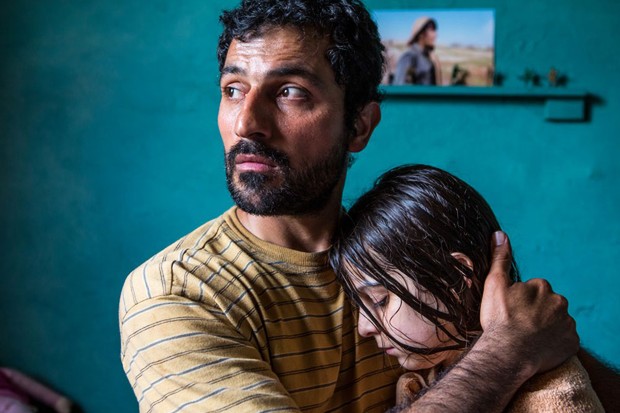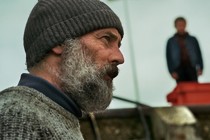Zagros: A migrant in love
- Sahim Omar Kalifa highlights the conditions experienced by women in Kurdistan in his portrayal of a lost man who migrates for love

Through his radical portrait of a lost man, an almost involuntary migrant, Sahim Omar Kalifa returns with his debut feature film Zagros [+see also:
trailer
interview: Sahim Omar Kalifa
film profile], which focuses on the conditions faced by women in Kurdistan, the weight of traditions and familial influence.
Zagros (Feyyaz Duman) is a shepherd in Kurdistan, in the mountains of Zagros themselves. He is happy and fulfilled, as radiant as the nature that surrounds and surprises him every day. He’s all the more fortunate for loving his wife, Havin (Halima Ilter), and their daughter more than anything in the world, who live this rural and bucolic life with him, close to the earth and the elements. But a storm is brewing off the Kurdish mountains, in the spirit of his wife. Havin comes from the town, and gradually becomes the victim of the excessively narrow mentality of the small village where they have established their home. Her freedom of speech and behaviour does not sit well with local customs. Overwhelmed by rumours, she feels threatened and seeks to flee the lethal community by any means possible. Her sister, a guerrilla, heroine and feminist warrior, encourages her to flee to Belgium, against the advice of Zagros, who, although madly in love with his wife, and aware of her discomfort, does not feel ready to leave the mountains. One day, he is faced with a fait accompli: his wife, pregnant, has fled to join a cousin in Belgium, hoping for a better life for their daughter, baby and herself. Confronted with the violence of the feelings of his peers, and the weight of the rumour itself, Zagros decides, almost in spite of himself, to embark on the journey and find his wife.
But once in Belgium, things don’t quite go as planned. Not only is the country not openly welcoming, but by ignoring the codes of society that are so foreign to him, he fails to reopen any sort of dialogue with his wife, who is thrilled by the possibility of freedom. Not to mention that his family has no intention of stopping there and letting his name dirty their honour. When Zagros's father arrives in Belgium, confrontation is inevitable: between father and son, but also between husband and wife. Just like an ancient tragedy, pursued by doubt, rumours and devoured by jealousy, Zagros will tumble, the victim of a dramatic irony that hovers over the story.
Zagros paints the portrait of a man who, by yielding to the sirens of suspicion, rumours and family tradition, is also alienated by the degradation of women which his class seeks to perpetuate. A deprivation of freedom which he will also end up experiencing, in tragic circumstances that he brings upon himself.
Zagros was produced by A Private View, in co-production with Man's Films and Viking Film. The film world premiered last night at Ghent Festival and will be released in Belgium on 15 November, distributed by Cinéart.
(Translated from French)
Did you enjoy reading this article? Please subscribe to our newsletter to receive more stories like this directly in your inbox.

























